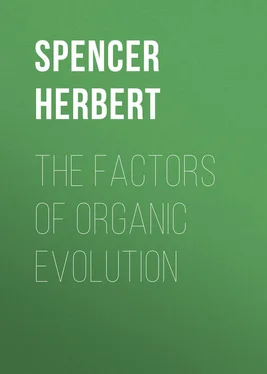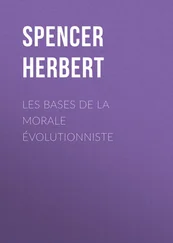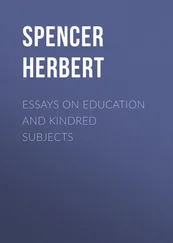Herbert Spencer - The Factors of Organic Evolution
Здесь есть возможность читать онлайн «Herbert Spencer - The Factors of Organic Evolution» — ознакомительный отрывок электронной книги совершенно бесплатно, а после прочтения отрывка купить полную версию. В некоторых случаях можно слушать аудио, скачать через торрент в формате fb2 и присутствует краткое содержание. Жанр: Философия, foreign_antique, foreign_prose, на английском языке. Описание произведения, (предисловие) а так же отзывы посетителей доступны на портале библиотеки ЛибКат.
- Название:The Factors of Organic Evolution
- Автор:
- Жанр:
- Год:неизвестен
- ISBN:нет данных
- Рейтинг книги:3 / 5. Голосов: 1
-
Избранное:Добавить в избранное
- Отзывы:
-
Ваша оценка:
- 60
- 1
- 2
- 3
- 4
- 5
The Factors of Organic Evolution: краткое содержание, описание и аннотация
Предлагаем к чтению аннотацию, описание, краткое содержание или предисловие (зависит от того, что написал сам автор книги «The Factors of Organic Evolution»). Если вы не нашли необходимую информацию о книге — напишите в комментариях, мы постараемся отыскать её.
The Factors of Organic Evolution — читать онлайн ознакомительный отрывок
Ниже представлен текст книги, разбитый по страницам. Система сохранения места последней прочитанной страницы, позволяет с удобством читать онлайн бесплатно книгу «The Factors of Organic Evolution», без необходимости каждый раз заново искать на чём Вы остановились. Поставьте закладку, и сможете в любой момент перейти на страницу, на которой закончили чтение.
Интервал:
Закладка:
Nor is this all. Far more numerous appropriate variations would be indirectly necessitated. The immense change in the ratio of fore-quarters to hind-quarters would make requisite a corresponding change of ratio in the appliances carrying on the nutrition of the two. The entire vascular system, arterial and veinous, would have to undergo successive unbuildings and rebuildings to make its channels everywhere adequate to the local requirements; since any want of adjustment in the blood-supply in this or that set of muscles, would entail incapacity, failure of speed, and loss of life. Moreover the nerves supplying the various sets of muscles would have to be proportionately changed; as well as the central nervous tracts from which they issued. Can we suppose that all these appropriate changes, too, would be step by step simultaneously made by fortunate spontaneous variations, occurring along with all the other fortunate spontaneous variations? Considering how immense must be the number of these required changes, added to the changes above enumerated, the chances against any adequate re-adjustments fortuitously arising must be infinity to one.
If the effects of use and disuse of parts are inheritable, then any change in the fore parts of the giraffe which affects the action of the hind limbs and back, will simultaneously cause, by the greater or less exercise of it, a re-moulding of each component in the hind limbs and back in a way adapted to the new demands; and generation after generation the entire structure of the hind-quarters will be progressively fitted to the changed structure of the fore-quarters: all the appliances for nutrition and innervation being at the same time progressively fitted to both. But in the absence of this inheritance of functionally-produced modifications, there is no seeing how the required re-adjustments can be made.
Yet a third class of difficulties stands in the way of the belief that the natural selection of useful variations is the sole factor of organic evolution. This class of difficulties, already pointed out in § 166 of the Principles of Biology , I cannot more clearly set forth than in the words there used. Hence I may perhaps be excused for here quoting them.
“Where the life is comparatively simple, or where surrounding circumstances render some one function supremely important, the survival of the fittest may readily bring about the appropriate structural change, without any aid from the transmission of functionally-acquired modifications. But in proportion as the life grows complex – in proportion as a healthy existence cannot be secured by a large endowment of some one power, but demands many powers; in the same proportion do there arise obstacles to the increase of any particular power, by “the preservation of favoured races in the struggle for life.” As fast as the faculties are multiplied, so fast does it become possible for the several members of a species to have various kinds of superiorities over one another. While one saves its life by higher speed, another does the like by clearer vision, another by keener scent, another by quicker hearing, another by greater strength, another by unusual power of enduring cold or hunger, another by special sagacity, another by special timidity, another by special courage; and others by other bodily and mental attributes. Now it is unquestionably true that, other things equal, each of these attributes, giving its possessor an extra chance of life, is likely to be transmitted to posterity. But there seems no reason to suppose that it will be increased in subsequent generations by natural selection. That it may be thus increased, the individuals not possessing more than average endowments of it, must be more frequently killed off than individuals highly endowed with it; and this can happen only when the attribute is one of greater importance, for the time being, than most of the other attributes. If those members of the species which have but ordinary shares of it, nevertheless survive by virtue of other superiorities which they severally possess; then it is not easy to see how this particular attribute can be developed by natural selection in subsequent generations. The probability seems rather to be, that by gamogenesis, this extra endowment will, on the average, be diminished in posterity – just serving in the long run to compensate the deficient endowments of other individuals, whose special powers lie in other directions; and so to keep up the normal structure of the species. The working out of the process is here somewhat difficult to follow; but it appears to me that as fast as the number of bodily and mental faculties increases, and as fast as the maintenance of life comes to depend less on the amount of any one, and more on the combined action of all; so fast does the production of specialities of character by natural selection alone, become difficult. Particularly does this seem to be so with a species so multitudinous in its powers as mankind; and above all does it seem to be so with such of the human powers as have but minor shares in aiding the struggle for life – the æsthetic faculties, for example.”
Конец ознакомительного фрагмента.
Текст предоставлен ООО «ЛитРес».
Прочитайте эту книгу целиком, купив полную легальную версию на ЛитРес.
Безопасно оплатить книгу можно банковской картой Visa, MasterCard, Maestro, со счета мобильного телефона, с платежного терминала, в салоне МТС или Связной, через PayPal, WebMoney, Яндекс.Деньги, QIWI Кошелек, бонусными картами или другим удобным Вам способом.
1
It is probable that this shortening has resulted not directly but indirectly, from the selection of individuals which were noted for tenacity of hold; for the bull-dog's peculiarity in this respect seems due to relative shortness of the upper jaw, giving the underhung structure which, involving retreat of the nostrils, enables the dog to continue breathing while holding.
Интервал:
Закладка:
Похожие книги на «The Factors of Organic Evolution»
Представляем Вашему вниманию похожие книги на «The Factors of Organic Evolution» списком для выбора. Мы отобрали схожую по названию и смыслу литературу в надежде предоставить читателям больше вариантов отыскать новые, интересные, ещё непрочитанные произведения.
Обсуждение, отзывы о книге «The Factors of Organic Evolution» и просто собственные мнения читателей. Оставьте ваши комментарии, напишите, что Вы думаете о произведении, его смысле или главных героях. Укажите что конкретно понравилось, а что нет, и почему Вы так считаете.












